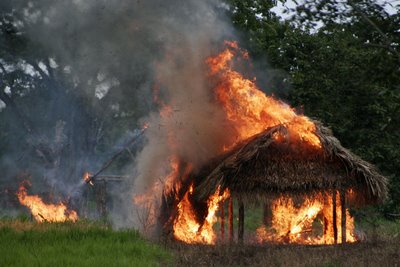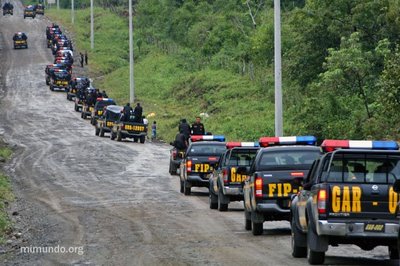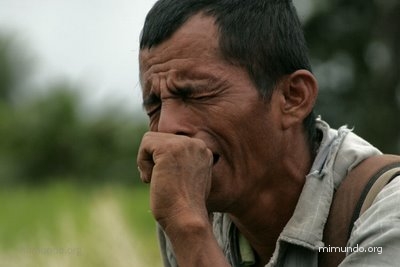UPDATE:
Judge Rules that Canadian Ambassador Slandered Documentary Video Maker
Both Ambassador
and the Canadian Government are ordered to pay almost $10,000.00 in damages
and costs
Toronto: On June 16, 2010 an Ontario judge ruled that former Canadian
Ambassador to Guatemala, Kenneth Cook, slandered Ph.D. student and
videographer Steven Schnoor by making false statements about a
documentary video that Schnoor made that was critical of the practices
of a Canadian mining company.
In January 2007, Schnoor made a short documentary depicting the violent
eviction of Mayan subsistence farmers from their homes in rural
Guatemala at the behest of a Canadian mining company. This documentary
includes footage of a woman who protests loudly about the
evictions. It also includes a number of still photographs,
including one of a community member in despair with his head in his
hand.
Justice Pamela Thomson has ruled that in a meeting conducted at the
Canadian Embassy in Guatemala City in February 2007, Ambassador Cook
said that the woman in the documentary was paid to act in the video and
that the photograph of the man in despair was not taken at the
evictions, but was a stock photograph that had been used before.
Justice Thomson held that the Ambassador’s statements were defamatory
and were not true. She further held that “the Ambassador was
reckless”, and that “he should have known better”.
Justice Thomson also drew attention to the behaviour of the Canadian
government in the months after the defamatory comments were
spoken. She held that the “dead silence” that Schnoor
received in response to his request for an explanation, retraction and
apology, was “spiteful and oppressive”.
Steven Schnoor testified at trial that the Ambassador’s comments served
to undermine the credibility of the people in the video.
“I am glad that there has finally been some accountability for the
Ambassador’s actions. As the judge said, this defamation was
serious.” Schnoor said.
“To me, this is a very big problem – it’s not just about me and one
particular video. I am concerned that this is an example of
how the Government of Canada is quick to discount the voices of people
who are harmed by Canadian mining companies. I hope that more
Canadians will lend their voice to the growing numbers who are already
saying that this is not what they expect from their government.”
Click here for the judge's order.
ABOUT THE CASE:
Former Canadian Ambassador to Guatemala Kenneth Cook is alleged to have slandered Steven Schnoor, the maker of a documentary film that was critical of a Canadian mining company's actions. Ambassador Cook's statements had the effect of shielding the Canadian company from accusations of human rights abuse.
In early 2007, Steven Schnoor made a documentary video depicting the eviction of indigenous Mayan Q’eqchi’ farmers from their ancestral land near El Estor, Guatemala – land that they had recently reclaimed. The forcible evictions were carried out by hundreds of heavily-armed state police, military and private security forces at the behest of Canadian mining company Skye Resources.[1]
In the days after the film was released on youtube.com, Ambassador Cook quietly spread misinformation that undermines the film’s message. He stated that the film was not credible, that the Mayan Q’eqchi’ woman depicted in the film was a paid actress, and that the photos of houses being burnt to the ground were in fact taken years before in the context of the Guatemalan civil war – all of which is demonstrably false.

Ambassador Cook’s slanderous attack appears to be an example of the Government of Canada’s disturbing and ongoing practice of providing extensive support for Canadian mining companies even in the face of serious human rights abuses and social and environmental harms caused by these companies (for other examples, see here and here). It is also an example of Canada’s continuing troubling relationship with the region dating back to the beginnings of Guatemala’s bloody civil war (for more information see this detailed timeline of Canada’s involvement in Guatemala and El Estor).
Instead of using his position as Ambassador to help resolve what was quickly becoming a very tense dispute, the Ambassador made statements that undermined the vital and truth-bearing testimony of a vulnerable, marginalized and exploited people while Canada’s mining companies conducted controversial evictions and took steps that resulted in the militarization of the region.
In the months since the Ambassador’s comments, the situation around El Estor has gotten worse. In September 2009, after another botched attempt to resolve the land conflict, it has been reported that the mine’s private security forces shot eight individuals, including community leader and local school teacher Adolfo Ich Chamán, who was specifically targeted and killed (for more information see Rights Action's report on the El Estor killings).
Steven Schnoor originally attempted to address concerns regarding the Ambassador’s role in the conflict through dialogue with the Department of Foreign Affairs, but after receiving a form letter that failed to address any of the serious concerns raised by him, Steven reluctantly decided that a defamation lawsuit against Ambassador Cook in small claims court was a necessary and more effective way to defend both his film and the voices of the indigenous Mayan Q’eqchi’ that Canada has marginalized. It is expected that a trial will be held in mid 2010.
Click for the statement of claim
 |
 |